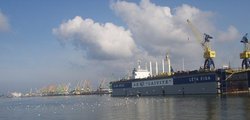Klaipeda
|
|
Klaipėda (approximate English transcription [ˈklaı.pɛ.dʌ], simplified Lithuanian transcription [klaǐpēda]; German Memel or Memelburg) is Lithuania's only seaport on the Baltic Sea. It has 194,400 inhabitants (2002), down from 202,900 in 1989. Today Klaipeda is a major ferry port with connections to Sweden, Denmark, and Germany. It is situated close to the mouth of the Curonian Lagoon.
The buildings of Klaipeda have a picturesque framework architecture similar to that found in Germany, England, and Denmark. Popular Lithuanian seaside resorts found close to Klaipeda are Neringa and Palanga.
| Contents |
History
As the settlement of Baltic tribes Klaipeda is known in the first centuries AD. For a long time it belonged to East Prussia, during which time it was called Memel.
The Teutonic Knights founded a castle upon the Baltic settlement in 1252 and recorded it as Castrum Memele (German Memelburg, also Mimmelburg). In 1254 Memel was granted Lübeck City Rights.
Memel_historisch.JPG
The area was converted to Christianity by the Teutonic Knights. The Peace at Melno-See in 1422 fixed the border between Province of Prussia and Lithuania. Memel remained included in Prussia and the border remained unchanged until 1919. It was one of the longest unchanged borders in Europe, and is referenced in the now-unsung first verse of the German national anthem, describing the borders of German-speaking lands: Von der Maas bis an die Memel, referring to the river Neman, or Memel in German.
Beginning in 1474 Memel was governed by the Culm Law of the Prussian Land cities. In 1525 Ducal Memel, under Albert of Prussia (Albrecht von Brandenburg-Ansbach-Prussia), adopted Lutheranism. It was the beginning of a long time of prosperity for the city and port, since Ducal Prussia was a Polish fief and later part of the Polish-Lithuanian Commonwealth. This border city served as port for neighbouring Lithuania, benefiting from its location near the mouth of the Neman River. The end of the prosperous times came, when between 1629 and 1635 Memel was attacked, damaged, and occupied by Sweden. It was rebuilt numerous times and 75 years later a large number of people in Memel died of the plague. With the creation of the united German state in 1871 Memel became the most north-easterly city of Germany. Still, according to 1905 census, almost half of the inhabitants of the region declared Lituanian as their mother tongue.
Since Lithuania did not exist as an independent country immediately after the end of World War I, with the Treaty of Versailles the town of Memel and the surrounding territory was placed under the protectorate of the Entente States. The territory was called Memelland and was separated from Germany and an autonomous government under temporary French jurisdiction was installed. However the French left after Lithuanian uprising in 1923 under the command of Colonel Budrys. The acquisition had enormous consequences for Lithuanian economy, as the region accounted for as much as 30% of the country's whole production. In 1925 over 51% of the population of the region was of Lithuanian nationality. Shortly before World War II, facing Nazi militarism, and not being able to effectively defend itself against Germany, Lithuania was forced to transfer the town together with surrounding territories of Klaipeda Region to the German Reich on March 22, 1939, after its annexations of Austria, Sudetenland, and Bohemia and Moravia.
During the Second World War, starting at the end of 1944 and into 1945, the inhabitants fled during active fighting. The city was captured by the Red Army in January 1945 and again given to the Lithuanian Soviet Republic, which in 1947 renamed the town to Klaipeda.
People born in Klaipeda
- Simon Dach (1605 - 1659), poet
- Rev. Michael Wohlfahrt (1687 - 1741), religious leader in America
- Friedrich Wilhelm Argelander (1799 - 1875), astronomer
- George Adomeit (1879 - 1967), American painter
- Immanuel Kant's grandfather and father
See also
External links
- Official website of the city of Klaipeda (http://www.klaipeda.lt/)
- Official website of the Klaipeda seaport (http://www.portofklaipeda.lt/)
- Page on the history of Memel/Klaipeda (http://worldatwar.net/nations/other/memel/) by Richard Doody
- University of Klaipeda (http://www.ku.lt/)bg:Клайпеда
ca:Klaipeda cs:Klajpeda da:Klaipeda de:Klaipėda als:Klaipeda es:Klaipeda eo:Klaipeda fr:Klaipéda fy:Klaipeda ko:클라이페다 id:Klaipeda it:Klaipeda he:קליפדה la:Memela lv:Klaipēda lt:Klaipėda lb:Klaipeda jbo:Klaipedas nl:Klaipeda nds:Klaipeda ja:クライペダ nb:Klaipeda nn:Klaipeda pl:Kłajpeda pt:Klaipėda ro:Klaipėda ru:Клайпеда scn:Klaipeda su:Klaipéda fi:Klaipeda sv:Klaipeda tl:Klaipeda tt:Klaipėda th:ไคลเพดา vi:Klaipėda wa:Klaipeda zh:克莱佩达

